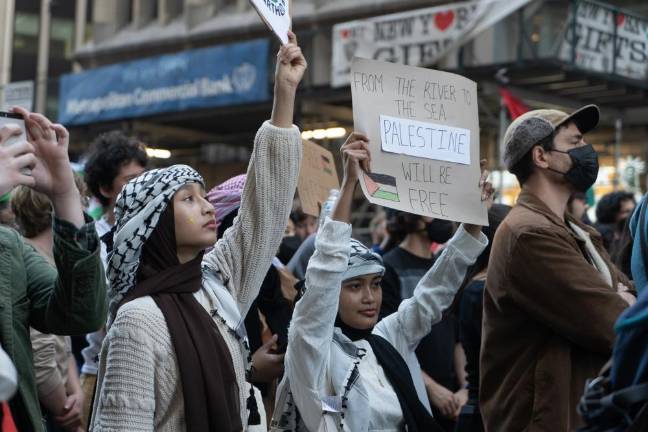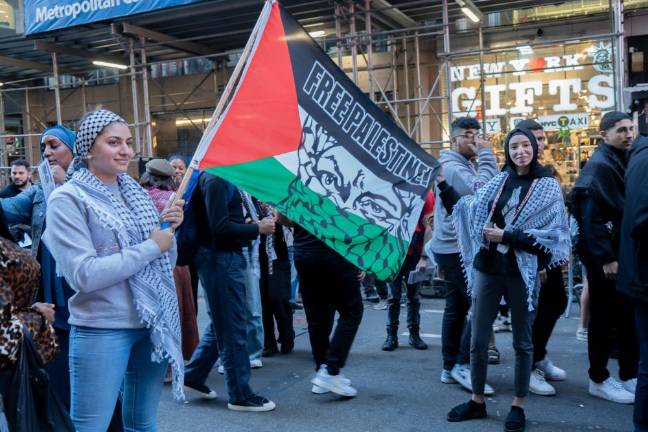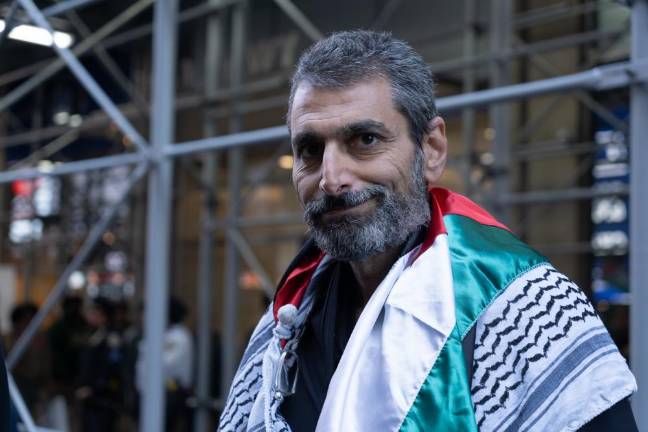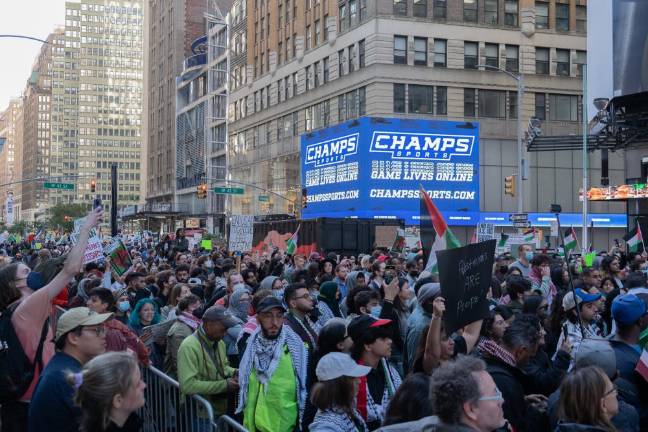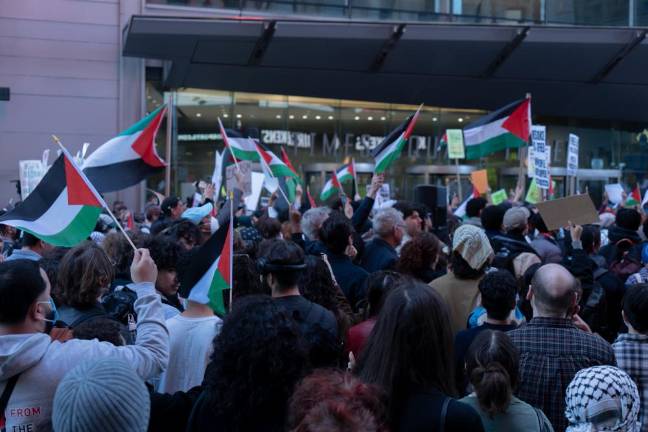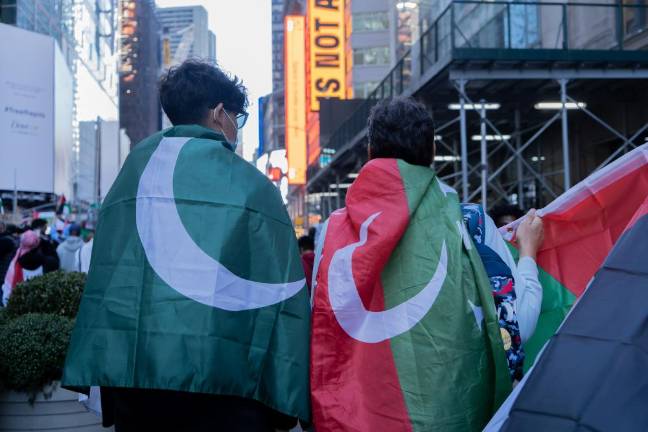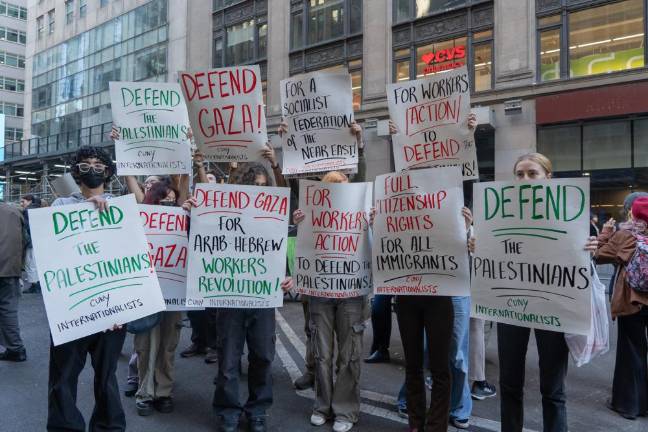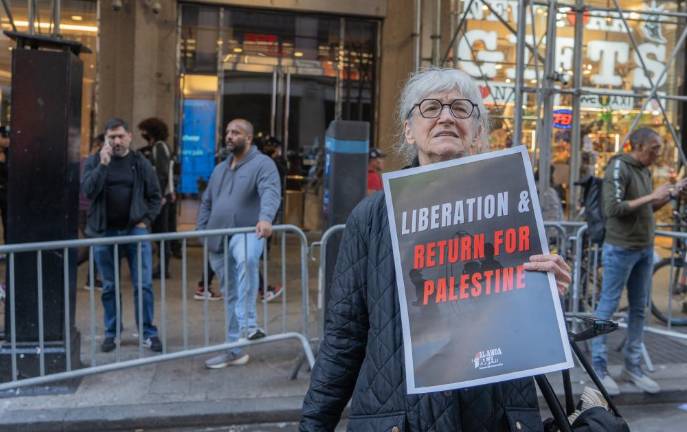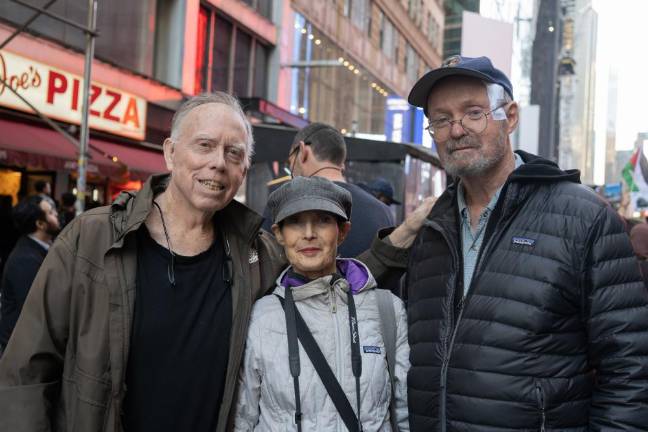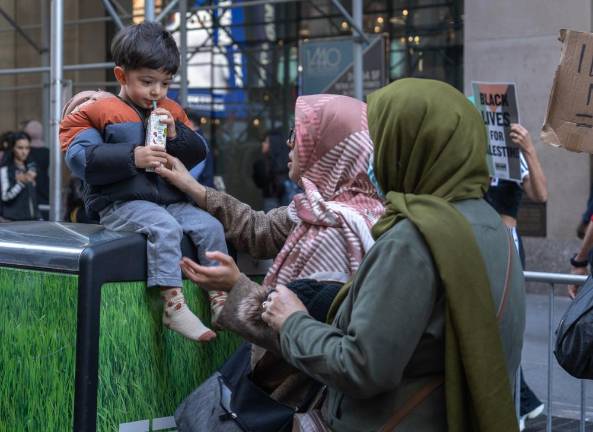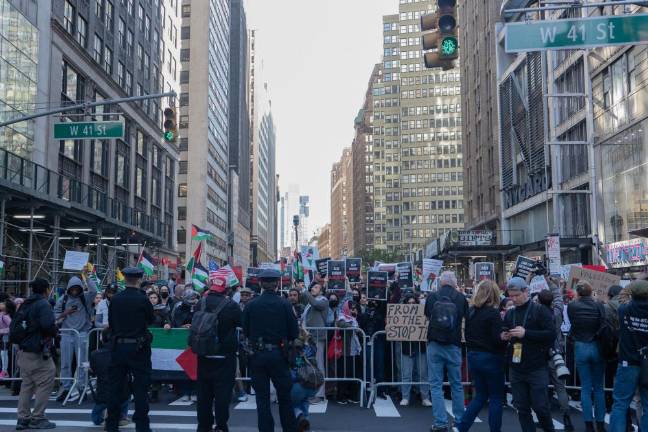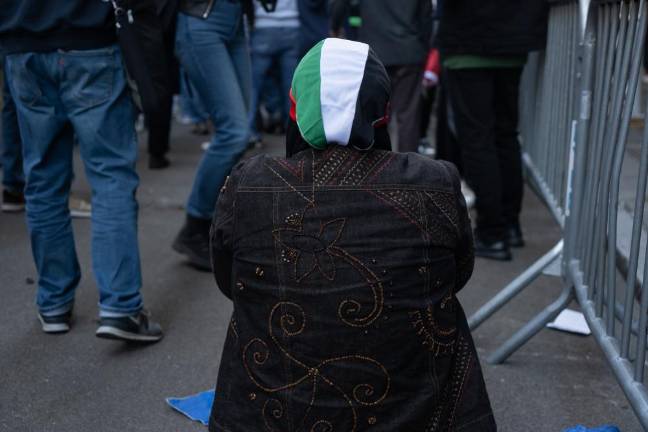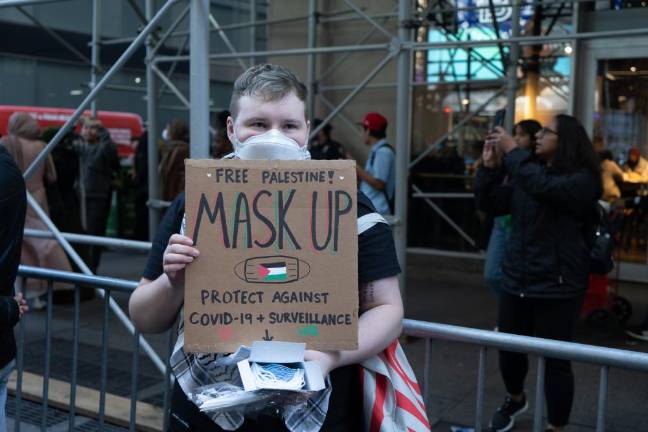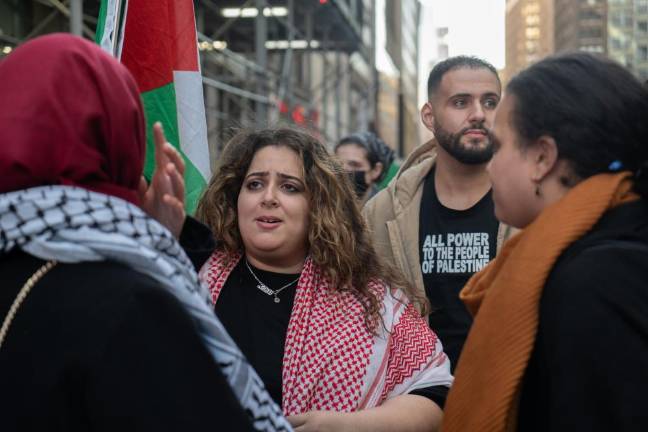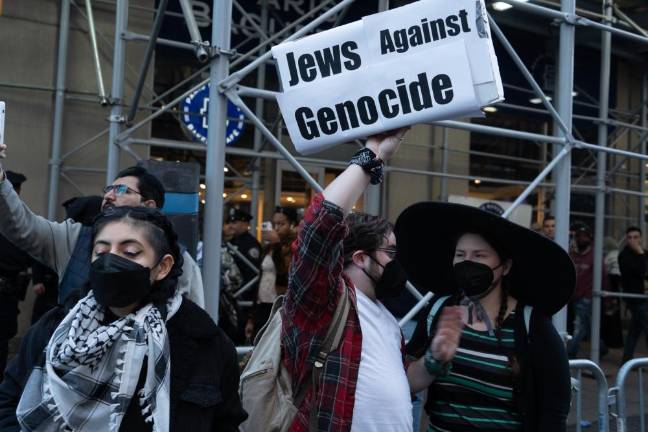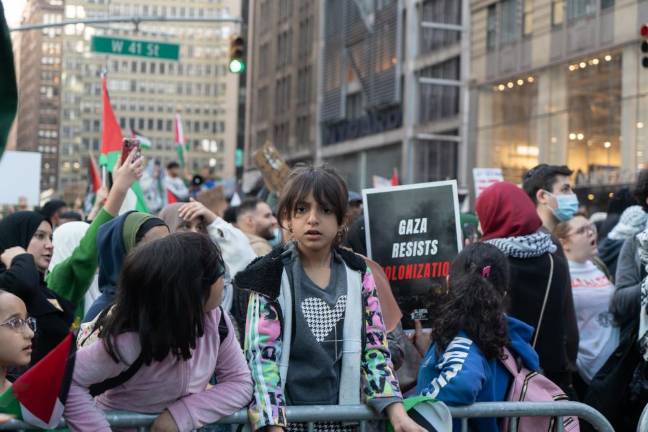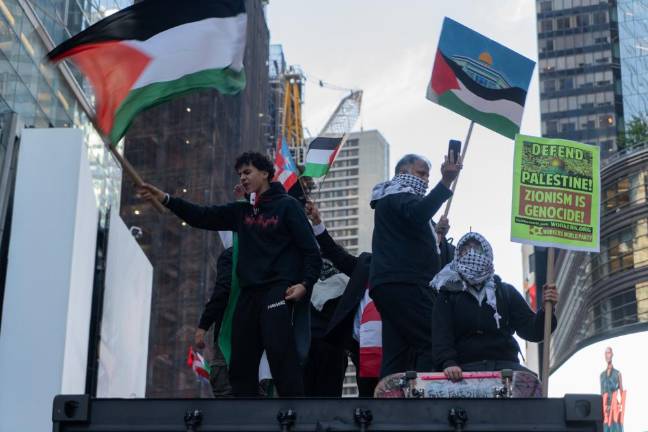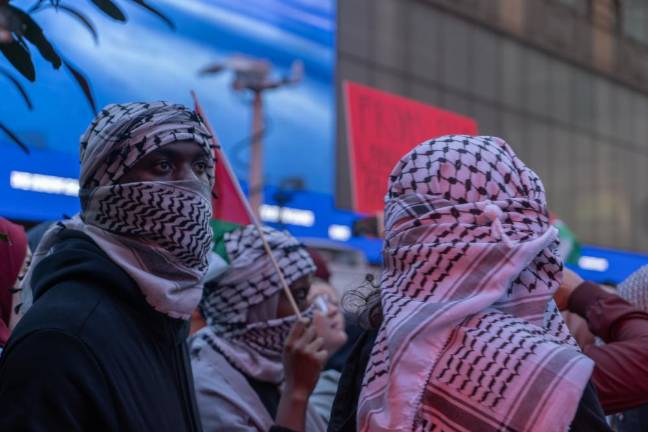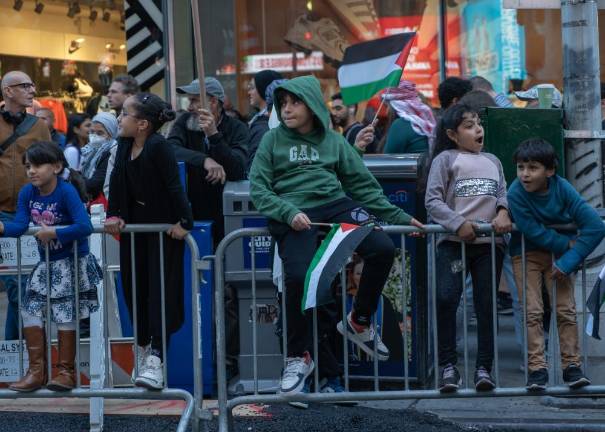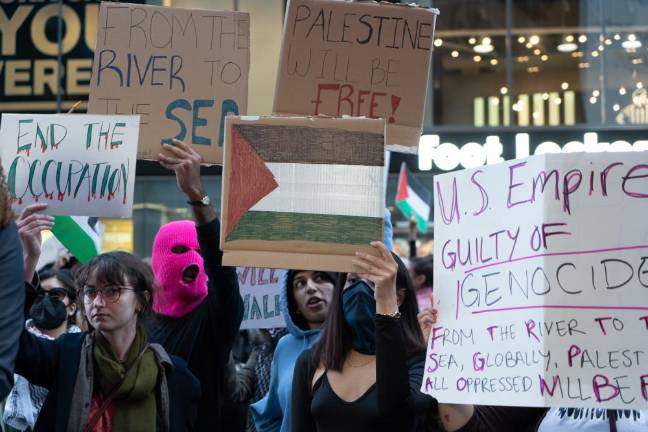Thousands Gather to Support Palestine and Decry Israeli Policies
At a pro-Palestinian demonstration in Times Square on October 13, protestors clamored for a free Palestine even as most political leaders in the city voiced support for Israel. The protest focused less on the Oct. 7 attacks by Hamas and more on pent-up frustration over the treatment of Palestinians for the past 75 years and fear over a coming invasion of Gaza.
A Hamas attack that killed 1,400 Israelis and retaliatory Israeli strikes that have killed 2,600 Palestinians in the Gaza Strip so far has provoked intense, emotional, and often belligerent reactions.
For Saeed, a Palestinian immigrant who moved to the United States 20 years ago, his presence at a pro-Palestine rally near Times Square on Oct. 13th not only represented solidarity with Palestinians besieged in Gaza, but also what he called collective pain borne from the Palestinian people’s continued displacement, erasure, and oppression by the Israeli government and its backers.
Palestinians call this state of anguished existence their nakba–catastrophe. It began in 1948–what Israelis know as their year of independence–when more than 750,000 Palestinians fled or were forcibly expelled from their homes. With 2 million Palestinians in Gaza struggling with acute shortages due to an Israeli-Egyptian blockade and bracing for an imminent ground offensive by the Israeli Defense Force (IDF), Saeed fears that his people’s suffering will become worse than ever before.
“It really feels like open season to hunt down Palestinians, and it’s scary,” said Saeed. “But this is exactly the face of Israel. There’s nothing new here. We know this about them, and they have a blank check from Western countries to ethnically cleanse Palestinians.”
Saeed was one of thousands of demonstrators that gathered in Midtown on October 13, in a largely peaceful protest, demanding the end of what they referred to as Israel’s apartheid policies and illegal settlement of the Palestinian West Bank, American military aid to Israel, and the Israeli blockade and bombardment of the Hamas-controlled Gaza Strip. Chants of “Free Palestine,” supported by the pounding of makeshift drums, reverberated across Times Square and the surrounding area at least two blocks away from Broadway and 42nd Street, which was the epicenter of the protest on this day.
Several demonstrators identified themselves as Jewish by their signs, such as those that read “Jews Against Apartheid.” For Allan Benjamin, his stand for Palestine has caused friction with his wife’s family in Israel, still reeling from the bloodiest several days for civilians in the country’s history. “It’s not easy to talk to them because they feel like we’re abandoning them, even though we’re not,” he said. “Understandable, after they’ve seen the images of [the Hamas attacks and their victims]... it’s really heavy.”
Allan came with three other Jewish American friends who became acquainted at a 1967 protest against the Vietnam War. “We were young and white-hot with anger, and that’s how we feel today as well,” said Cliff Conner, Allan’s friend. His strong feelings about Palestine are colored, in part, by the Jewish experience. For him, historical memories of the Holocaust provide a moral imperative to protest against the Israeli government, he said, rather than “cynically use it to justify any policy they want and put another people–Palestinians–under oppressive conditions.”
Joan Conner, Cliff’s wife and another member of the group, said regarding the Hamas attacks that two wrongs did not make a right. “I am Jewish and when innocent people die it is always sad,” she said. “This does not give Israel the right to oppress the Palestinian people with pogroms, blockades, apartheid policies–things they’ve been doing for a long time and that causes so much hate in the first place.”
Arabs and Muslims from other countries also showed up in force. Lobna, a young Tunisian woman, said that as a fellow Arab she had always grown up hearing about the suffering of Palestinians. “I feel like Arabs are nice people and can compromise living with Israelis,” she said. “I feel like the problem is on the Israeli side, where they keep pushing and oppressing and causing so much hatred, and if it never came to this point Palestinians would be able to compromise with Israelis rather than Hamas killing them.”
Ahmad, a Pakistani-born resident of New Jersey, expressed horror at the situation in Gaza, which he described as a prison being bombarded from above. “Tell me one instance in history where people were caged and then bombed,” he said. “I don’t know. For me, Palestine is a litmus test for humanity... if you don’t get it, I think it’s only because either you don’t want to or you need to know more.” Ahmad came to the rally with his son, who covered his face for fear that he might be identified and fall victim to retaliation for his beliefs.
At this moment, the plight of 2 million Palestinians besieged in the Gaza Strip presents the most urgent crisis for many human rights activists and organizations. Israel has warned Palestinian residents in the Strip’s northern half to evacuate southwards, but White House national security advisor Jake Sullivan acknowledged that such a massive exodus through an active warzone would be a “tall order” on such short notice.
Statements by Israeli politicians on the eve of an expected invasion have caused further alarm. Israeli president Isaac Herzog seemed to hold Palestinians collectively guilty for the Hamas killings, declaring at an October 13 press conference that “it is an entire nation out there that is responsible.” While the international press is largely focused on Gaza, there have also been reports of killings and arrests of Palestinians in the West Bank by IDF soldiers and Israeli settlers.
“I don’t understand how people who denounced Hamas for killing people can also say, ‘level Gaza to the ground and kill the Palestinians,’ said Helen, an 81-year-old Jewish American woman. “They don’t even see their hypocrisy.”
To supporters of Palestine, it is hypocrisy that defines the international reaction to the escalating violence, especially in Western countries. “You would find, especially on the left, some agreement that colonialism is wrong, oppression is wrong, slavery is wrong,” said Saeed. “But when it comes to Palestine, there’s often a kind of caution, and part of it comes from a fear of retaliation, of being called anti-Semitic.” As a Palestinian with family members who remained behind, Saeed is particularly wary of the Shin Bet, the Israeli intelligence agency that he says is “prosecuting anyone who’s posting on social media that shows a heart for Gaza or expresses any sympathy for the Palestinians.” He declined to give his last name to reporters.
Some European countries have taken measures to curb demonstrations of Palestinian solidarity. France issued a blanket ban on all pro-Palestine rallies shortly after the Hamas attacks, citing concerns about public safety. This was met with direct defiance as thousands of protestors gathered in support of Palestine on October 12. Authorities in Berlin and Vienna banned individual rallies from taking place–when protesters gathered in Potsdamer Platz anyway, German police dispersed them with tear gas.
“Today, standing up for Palestine is criminalized not just in Palestine; it’s criminalized everywhere,” said Saeed. “You have to ask yourself, what’s so threatening about Palestine and asking for freedom for Palestine?”
Saeed did not think that he would see his country liberated in his lifetime. But reflections on history and recent demonstrations of support on the street, he says, has turned his pessimism into hope. “When apartheid in South Africa fell, it had the support of most European countries and the US, and Nelson Mandela was still on the terrorist list,” he said. “Now they greet Mandela as a hero.” Saeed believes that a similar reckoning is taking place in Israel and Palestine, with public pressure having the potential to reshape US foreign policy in the region.
Regardless of the outcome, Saeed feels he is on the right side of history. “They can commit genocide and kill the people in Gaza and then move on to the other towns in Palestine,” he said. “But they will never ever erase or eliminate the idea of Palestine. And the idea of Palestine is that colonialism is dead. It cannot survive in this day.”
